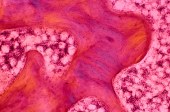- Could Artificial Sweeteners Be Aging the Brain Faster?
- Techniques for Soothing Your Nervous System
- Does the Water in Your House Smell Funny? Here’s Why
- Can a Daily Dose of Apple Cider Vinegar Actually Aid Weight Loss?
- 6 Health Beverages That Can Actually Spike Your Blood Sugar
- Treatment Options for Social Anxiety Disorder
- Understanding the Connection Between Anxiety and Depression
- How Daily Prunes Can Influence Cholesterol and Inflammation
- When to Take B12 for Better Absorption and Energy
- Epsom Salts: Health Benefits and Uses
Gene Therapy Shows Promise for Rare Immune Disorder


Gene therapy may benefit children and teens with a rare immune disorder called Wiskott-Aldrich syndrome, a small study finds.
The disorder — characterized by low blood platelet count, eczema and recurring infections — is caused by mutations in what’s known as the WAS gene. People with the disorder generally die by their 20s or 30s. Blood stem cell transplants from other people can help these patients, but they have a high rate of complications.
This study looked at a therapy in which the patient’s own blood stem cells are removed to correct the WAS gene. The blood stem cells are then injected back into the patient.
The gene therapy was performed in seven children and teens with Wiskott-Aldrich syndrome. They were then followed for nine to 42 months. One patient died of a preexisting infectious disease. The six surviving patients had fewer infections, less severe eczema and a decrease in autoimmune symptoms that occur when the immune system mistakenly attacks healthy cells, the researchers report.
No severe bleeding episodes occurred after the therapy, and hospitalizations were reduced from roughly 25 days in the two years before treatment to zero in most cases in the two years after treatment, said Dr. Marina Cavazzana, of Necker Children’s Hospital in Paris, France and colleagues.
Their study, published in the April 21 issue of JAMA, was funded by Genethon, a French company that develops gene therapies.
Because this was such a small study, the researchers said they “cannot draw conclusions on long-term outcomes and safety.” Additional trials are needed, along with further follow-up of these patients and participants in a similar study reported last year, they noted.
However, the study provides evidence that this type of gene therapy benefits patients with severe Wiskott-Aldrich syndrome, said the authors of an accompanying editorial in the journal.
“At a time when many are championing personalized medicine, no advance is as representative of that fundamental biological approach as gene therapy,” wrote Dr. Harry Malech, of the U.S. National Institutes of Health, and Dr. Hans Ochs, of the University of Washington.
More information
The National Marrow Donor Program has more about Wiskott-Aldrich syndrome.
Source: HealthDay
Copyright © 2026 HealthDay. All rights reserved.










